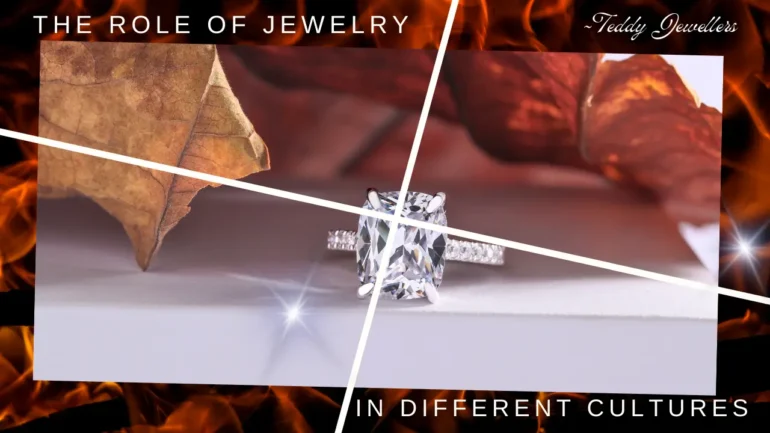🕒 Last Updated on August 19, 2025, 3:48 PM EDT
Jewelry has been an integral part of human culture for centuries. From adorning kings and queens to being a symbol of love and commitment, jewelry carries a significant cultural and emotional value. In this comprehensive guide, we will explore the role of jewelry in different cultures, its significance, and how it has evolved over time.
🎁 Want 100+ more gift ideas for FREE ? Check out our Ultimate Jewelry Gift Ideas (Updated 2025) — perfect for every style, occasion, and budget.
The Historical Significance of Jewelry
Ancient Egypt

In ancient Egypt, jewelry was not only a symbol of wealth but also held spiritual significance. Egyptians believed that jewelry could protect them from evil spirits and bring good luck. Gold was the most prized material, symbolizing eternity and divine power.
Ancient Greece

Greek jewelry was characterized by its intricate designs and use of precious stones. Jewelry was worn by both men and women, often reflecting their social status. It was also used in religious ceremonies and as offerings to the gods.
Ancient Rome

In ancient Rome, jewelry was a symbol of status and power. The Romans favored gold, silver, and gemstones, often incorporating them into elaborate designs. Jewelry was also used as a form of currency and to display loyalty to the empire.
The Role of Jewelry in Asian Cultures
India

In India, jewelry plays a vital role in cultural and religious ceremonies. It is an essential part of weddings, symbolizing prosperity and marital bliss. Traditional Indian jewelry includes gold necklaces, bangles, earrings, and nose rings, often adorned with intricate designs and precious stones.
China

Chinese jewelry is steeped in symbolism and tradition. Jade is particularly significant, representing purity and moral integrity. Gold and silver jewelry is often crafted into symbols such as dragons, phoenixes, and lotus flowers, each carrying its own cultural meaning.
Japan

In Japan, traditional jewelry includes hairpins, combs, and netsuke (miniature sculptures). Pearls are highly valued and are often used in necklaces and earrings. Japanese jewelry is known for its simplicity and elegance, reflecting the country’s cultural emphasis on harmony and balance.
The Role of Jewelry in African Cultures

Sub-Saharan Africa
Jewelry in Sub-Saharan Africa is often made from natural materials such as wood, bone, and beads. It is used in rituals, ceremonies, and as a form of communication. Different tribes have distinct styles and designs, each with its own cultural significance.
North Africa
In North Africa, jewelry is heavily influenced by Arab and Berber traditions. Silver is the preferred material, often inlaid with colorful gemstones. Jewelry is used as a form of dowry, a symbol of social status, and as protection against evil spirits.
The Role of Jewelry in Western Cultures

Europe
In Europe, jewelry has evolved from medieval times, where it was a symbol of nobility and power, to modern times, where it is a fashion statement. During the Renaissance, jewelry became more elaborate, incorporating intricate designs and precious stones. Today, European jewelry trends are diverse, ranging from classic to contemporary styles.
United States
In the United States, jewelry is a reflection of personal style and identity. It is used to mark special occasions such as engagements, weddings, and anniversaries. American jewelry trends are influenced by various cultures, resulting in a rich and diverse jewelry market.
Contemporary Jewelry Trends
Sustainable Jewelry
With growing awareness of environmental issues, sustainable jewelry is becoming increasingly popular. This includes pieces made from recycled materials, ethically sourced gemstones, and eco-friendly production methods.
Personalized Jewelry
Personalized jewelry, such as name necklaces and custom-made rings, is a trend that allows individuals to express their unique identity. This type of jewelry often holds sentimental value, making it a popular choice for gifts.
Minimalist Jewelry
Minimalist jewelry is characterized by simple, clean designs. It focuses on quality over quantity, with pieces that can be worn every day and easily paired with any outfit.
Teddy Jewellers’ Collection
Cultural Inspirations
At Teddy Jewellers, we celebrate the diversity and cultural significance of jewelry. Our collection features pieces inspired by various cultures, from traditional Indian bangles to minimalist Japanese designs.
Quality Craftsmanship
Our jewelry is crafted with the utmost care and attention to detail. We use high-quality materials, ensuring that each piece is not only beautiful but also durable.
Customization Options
We offer customization options to create pieces that reflect your personal style and cultural heritage. Whether you are looking for a traditional design or a modern twist, Teddy Jewellers has something for everyone.
Our Shop‘s Jewelry Collection
Follow us on Instagram
Follow us on Twitter (X)
#Jenniferhudson #jenniferhudsoncommon https://t.co/ANBFQKF8jh pic.twitter.com/3OjxjZihUv
— Teddy Jewellers (@TeddyJewellers) June 10, 2024
FAQs
What is the significance of jewelry in different cultures?
Jewelry holds various meanings in different cultures, including symbols of wealth, power, spirituality, and social status. It is often used in rituals, ceremonies, and as a form of personal expression.
How has jewelry evolved over time?
Jewelry has evolved from ancient times, where it was primarily a symbol of wealth and power, to modern times, where it is a fashion statement and a reflection of personal style.
What are some popular contemporary jewelry trends?
Popular contemporary jewelry trends include sustainable jewelry, personalized pieces, and minimalist designs. These trends reflect growing awareness of environmental issues and a desire for unique, meaningful jewelry.
How can I choose the right piece of jewelry for me?
When choosing jewelry, consider your personal style, cultural heritage, and the occasion. Look for pieces that reflect your identity and complement your wardrobe.
